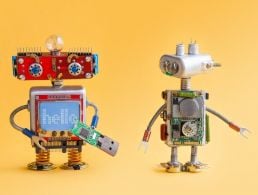Another day, another report of how machines are coming to take away your employment. Is it true?
PwC is the latest firm to offer a prediction of a robotic future, with up to 30pc of jobs currently employing people in the UK under threat.
The report gives a time frame of less than 15 years for the change to take effect, with a breakdown of sectors and numbers provided.
According to PwC, 2.25m jobs are at risk in wholesale and retail, 1.1m in admin and support, 1.2m in manufacturing and almost 1m in transport and storage.
“There’s no doubt that AI and robotics will rebalance what jobs look like in the future, and that some are more susceptible than others,” said Jon Andrews, head of technology and investments at PwC.
The rebalancing itself is not exactly a big problem, as new jobs will emerge in place of this. However, upskilling seems to be a necessity, with the positions under threat largely related to the less skilled fields of employment.
“What’s important is making sure that the potential gains from automation are shared more widely across society and no one gets left behind,” said Andrews.
“Responsible employers need to ensure they encourage flexibility and adaptability in their people so we are all ready for the change.”
Last year, a report from Forrester in the US predicted that 6pc of all jobs in the country would be automated by 2021.
Two primary areas of focus in the study were customer service – where chatbots are encroaching on humans in a big way – and transport, where huge sums of money are being invested in autonomous alternatives.
Forrester’s Brian Hopkins said: “By 2021, a disruptive tidal wave will begin.
“Solutions powered by AI [and] cognitive technology will displace jobs, with the biggest impact felt in transportation, logistics, customer service and consumer services.”
The future is nearing, too, with Amazon’s robot job growth outstripping that of human job growth.
Such is the fear that automation will eliminate millions of unskilled people from the workforce, novel responses have emerged.
For example, earlier this year, Microsoft co-founder Bill Gates said that robots and automated machines that cause a loss in human jobs should be taxed.
Gates, the world’s richest man and also a strong proponent of AI and automation, believes a robot tax could be used to finance jobs taking care of the elderly or teaching kids in schools.
His suggestion is quite similar to a proposal put to the European Parliament to tax robot owners so that those who lose their jobs to automation can be retrained.
That proposal to regulate the rise of robots was rejected by the European Parliament in February by 396 votes to 123.




